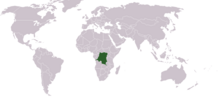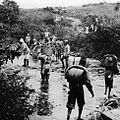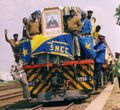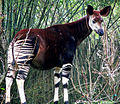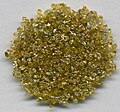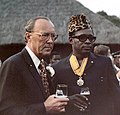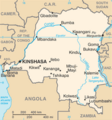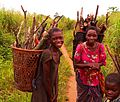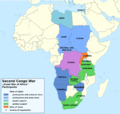Portal:Democratic Republic of the Congo
The Democratic Republic of the Congo Portal
DR Congo, officially the Democratic Republic of the Congo, also known as the DRC, Congo-Kinshasa or simply Congo, is a country in Central Africa. By land area, DR Congo is the second-largest country in Africa and the 11th-largest in the world. With a population of around 109 million, the Democratic Republic of the Congo is the most populous Francophone country in the world. The national capital and largest city is Kinshasa, which is also the economic center. The country is bordered by the Republic of the Congo, Central African Republic, South Sudan, Uganda, Rwanda, Burundi, Tanzania (across Lake Tanganyika), Zambia, Angola, the Cabinda exclave of Angola, and the South Atlantic Ocean. Centered on the Congo Basin, the territory of the Congo was first inhabited by Central African foragers around 90,000 years ago and was settled in the Bantu expansion about 3000 to 2000 years ago. In the west, the Kingdom of Kongo ruled around the mouth of the Congo River from the 14th to 19th centuries. In the center and east, the empires of Mwene Muji, Luba, and Lunda ruled from the 15th, 16th, and 17th centuries to the late 19th and early 20th centuries. King Leopold II of Belgium formally acquired rights to the Congo territory from the colonial nations of Europe in 1885 and declared the land his private property, naming it the Congo Free State. From 1885 to 1908, his colonial military forced the local population to produce rubber and committed widespread atrocities. In 1908, Leopold ceded the territory, which thus became a Belgian colony. Congo achieved independence from Belgium on 30 June 1960 and was immediately confronted by a series of secessionist movements, the assassination of Prime Minister Patrice Lumumba, and the seizure of power by Mobutu Sese Seko in a 1965 coup d'état. Mobutu renamed the country Zaire in 1971 and imposed a harsh personalist dictatorship until his overthrow in 1997 by the First Congo War. The country then had its name changed back and was confronted by the Second Congo War from 1998 to 2003, which resulted in the deaths of 5.4 million people and the assassination of President Laurent-Désiré Kabila. The war ended under President Joseph Kabila, who governed the country from 2001 to 2019 and under whom human rights in the country remained poor and included frequent abuses such as forced disappearances, torture, arbitrary imprisonment and restrictions on civil liberties. Following the 2018 general election, in the country's first peaceful transition of power since independence, Kabila was succeeded as president in a highly contentious election won by Félix Tshisekedi, who has served as president since. Since 2015, eastern Congo has been the site of an ongoing military conflict. The Democratic Republic of the Congo is extremely rich in natural resources but has suffered from political instability, a lack of infrastructure, corruption, and centuries of both commercial and colonial extraction and exploitation, followed by more than 60 years of independence, with little widespread development. Besides the capital Kinshasa, the two next largest cities, Lubumbashi and Mbuji-Mayi, are both mining communities. The DRC's largest export is raw minerals, with China accepting over 50% of its exports in 2019. In 2021, DR Congo's level of human development was ranked 179th out of 191 countries by the Human Development Index and is classed as a least developed country by the UN. As of 2018[update], following two decades of various civil wars and continued internal conflicts, around 600,000 Congolese refugees were still living in neighbouring countries. Two million children risk starvation, and the fighting has displaced 4.5 million people. The country is a member of the United Nations, Non-Aligned Movement, African Union, COMESA, Southern African Development Community, Organisation Internationale de la Francophonie, and Economic Community of Central African States. (Full article...) Selected article -Dikembe Mutombo Mpolondo Mukamba Jean-Jacques Wamutombo (June 25, 1966 – September 30, 2024) was a Congolese-American professional basketball player. He played 18 seasons in the National Basketball Association (NBA). Nicknamed "Mount Mutombo" for his defensive prowess, he is commonly regarded as one of the greatest shot-blockers and defensive players of all time. Outside of basketball, he was known for his humanitarian work. A 7-foot-2-inch (2.18 m) center, Mutombo moved to the United States from the Democratic Republic of the Congo at age 21 to attend Georgetown University with the hope of eventually earning a medical degree and returning to the DRC to practice medicine. Those plans changed when John Thompson, coach of the Georgetown Hoyas, recruited him to play college basketball. Mutombo played three seasons for Georgetown, establishing a reputation as a tenacious defender. (Full article...) General images -The following are images from various Democratic Republic of the Congo-related articles on Wikipedia.
This is a Good article, an article that meets a core set of high editorial standards.
 From 1885 to 1908, many atrocities were committed in the Congo Free State (today the Democratic Republic of the Congo) under the absolute rule of King Leopold II of Belgium. These atrocities were particularly associated with the labour policies, enforced by colonial administrators, used to collect natural rubber for export. Combined with epidemic disease, famine, and falling birth rates caused by these disruptions, the atrocities contributed to a sharp decline in the Congolese population. The magnitude of the population fall over the period is disputed, with modern estimates ranging from 1.5 million to 13 million. The atrocities have been variously referred to as the Rubber Terror and by some as the Congolese Genocide, though the latter characterization is disputed. At the Berlin Conference of 1884–1885, the European powers recognized the claims of a supposedly philanthropic organisation run by Leopold II, to most of the Congo Basin region. Leopold had long held ambitions for colonial expansion. The territory under Leopold's control exceeded 2,600,000 km2 (1,000,000 sq mi), more than 85 times the territory of Belgium; amid financial problems, it was directed by a tiny cadre of administrators drawn from across Europe. Initially the quasi-colony proved unprofitable and insufficient, with the state always close to bankruptcy. The boom in demand for natural rubber, which was abundant in the territory, created a radical shift in the 1890s—to facilitate the extraction and export of rubber, all vacant land in the Congo was nationalised, with the majority distributed to private companies as concessions. Some was kept by the state. Between 1891 and 1906, the companies were allowed free rein to exploit the concessions, with the result being that forced labour and violent coercion were used to collect the rubber cheaply and maximise profit. The Free State's military force, the Force Publique, enforced the labour policies. Individual workers who refused to participate in rubber collection could be killed and entire villages razed. (Full article...)
This is a Featured article, which represents some of the best content on English Wikipedia..
Operation Grandslam was an offensive undertaken by United Nations peacekeeping forces from 28 December 1962 to 15 January 1963 against the forces of the State of Katanga, a secessionist state rebelling against the Republic of the Congo (now the Democratic Republic of the Congo) in Central Africa. The Katangese forces were decisively defeated and Katanga was forcibly reintegrated into the Congo. The United Nations had tried several times to reconcile the government of the Congo with the State of Katanga, which had declared independence under Moïse Tshombe with Belgian support in 1960. Though initially limiting its actions, the United Nations Operation in the Congo became increasingly impatient towards Katanga and Tshombe, drawing up plans to resolve the situation through force. Tshombe continuously violated agreements he had made with the United Nations and the Congolese government by building up his forces and bringing foreign mercenaries into the conflict. The situation reached a breaking point in December 1962 when Katangese gendarmes attacked peacekeeping forces in Katanga. United Nations Secretary-General U Thant authorised a retaliatory offensive to eliminate secessionist opposition. (Full article...)
WikiProjectsTopicsCategoriesRelated portalsAssociated WikimediaThe following Wikimedia Foundation sister projects provide more on this subject:
Discover Wikipedia using portals | ||||||||



